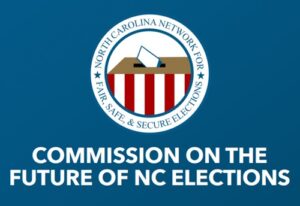
Special to IFN
Following 14 months of investigation, research and deliberation, the Commission on the Future of North Carolina Elections has released its final report, offering an in-depth, cross-partisan analysis of the state’s election processes and administration. The findings were unveiled at Catawba College, marking a major step in evaluating and strengthening North Carolina’s election system.
“The foundation of our representative democracy is a fair, safe, and secure electoral system in which all North Carolinians can have confidence,” stated the Commission’s steering committee, which includes Jennifer Roberts, former Democratic Mayor of Charlotte; Bob Orr, former Republican Justice of the N.C. Supreme Court; and Drs. Michael Bitzer (Catawba College), Chris Cooper (Western Carolina University), and Martha Kropf (UNC Charlotte).
The Commission, supported by Catawba College’s Center for N.C. Politics & Public Service, produced a nearly 200-page report examining 11 key areas of the state’s election system – from voter registration to election challenges and protests. The report outlines findings and considerations for policymakers and the public.
According to the report, North Carolina’s election system is well-administered and secure. The state employs strong safeguards, including a requirement that every ballot has a paper backup, and strict prohibitions on electronic ballot marking devices being connected to the internet.
Data from the N.C. State Board of Elections covering 2015 to 2022 shows that only 674 cases of alleged election fraud were recorded during that time – representing just 0.002 percent of all votes cast – indicating no evidence of widespread fraud. Despite this, the report finds that many voters remain unaware of these security measures, fueling skepticism about election integrity.
Public education emerged as a key priority in the Commission’s findings. The report highlights the impact of rampant misinformation and declining local news coverage in shaping public perceptions of elections. Many voters believe fraud and corruption are more common than they are, particularly regarding mail-in ballots and campaign financing. To combat misinformation and build trust, the report calls for more transparency in election procedures and suggests creative outreach efforts to engage voters across all demographics, including partnerships with trusted public figures.
Another key issue raised by the Commission is the rapid growth of unaffiliated voters in North Carolina. This group is expanding faster than any other voter registration category; yet current law makes it difficult for unaffiliated candidates to appear on partisan ballots and bars unaffiliated voters from serving on county Boards of Election. The Commission recommends reconsidering these restrictions to reflect the changing voter landscape.
The report also identifies barriers to voter access that disproportionately affect certain groups, including people with disabilities, non-native English speakers, and college students. Inconsistent county-by-county election procedures can create confusion and obstacles for these voters. The Commission suggests that standardized, statewide guidelines could improve participation and ensure a more accessible electoral process.
Beyond voters, the Commission found that election workers are facing increasing challenges, including staffing shortages, insufficient funding, and rising harassment. Many election offices are struggling to keep up with high workloads during peak election periods, and surveys indicate that intimidation and harassment are making it harder to recruit and retain workers. Alarmingly, due to retirements and resignations, more than half of North Carolina’s 100 county election directors oversaw a presidential election for the first time in 2024. To address these concerns, the report recommends greater investment in election staff salaries, de-escalation training, and security measures to protect workers.
While the Commission reached consensus on many issues, some larger structural concerns remain unresolved. Many voters see the redistricting process as unfair; yet the creation of an independent redistricting commission was deemed politically unlikely. The report also highlights concerns over how contested elections are decided in North Carolina. Under Article VI of the N.C. Constitution and NCGS § 163-182.13A, the N.C. General Assembly has the power to determine the outcome of contested races, a provision that raises questions about potential partisan influence.
Moving forward, the Commission’s work will continue under the N.C. Network for Fair, Safe, and Secure Elections, housed at Catawba College’s Center for N.C. Politics & Public Service. Future initiatives will further explore election integrity, administration, and ways to build public confidence in the process.
About the Commission on the Future of North Carolina Elections
The Commission on the Future of North Carolina Elections is a cross-partisan group of 60 North Carolinians dedicated to studying and improving the state’s election system. Supported by Catawba College’s Center for N.C. Politics & Public Service, the Commission’s work aims to ensure elections remain fair, safe, and secure for all voters. Visit www.NCElectionsFuture.com.



